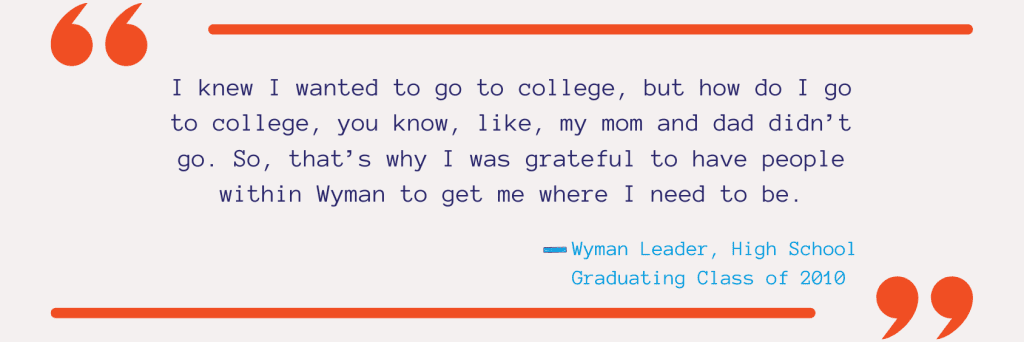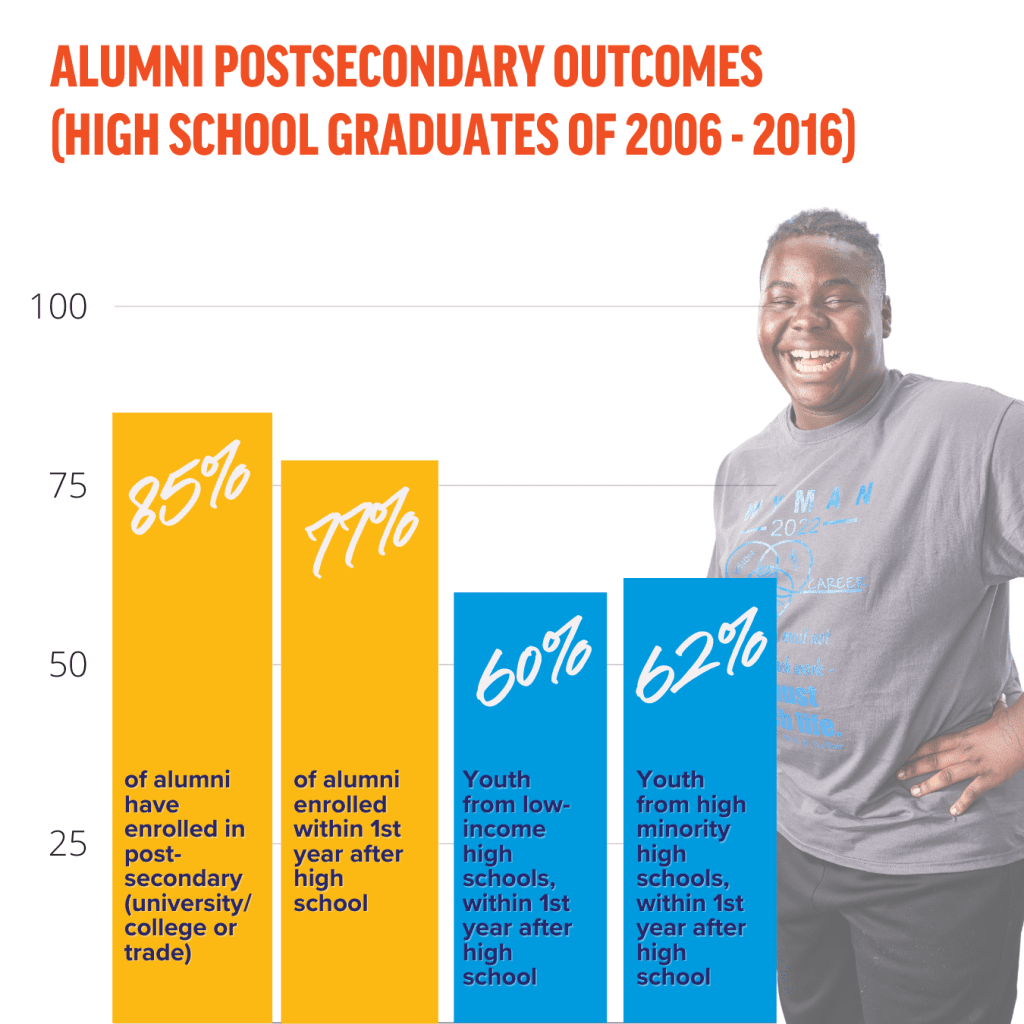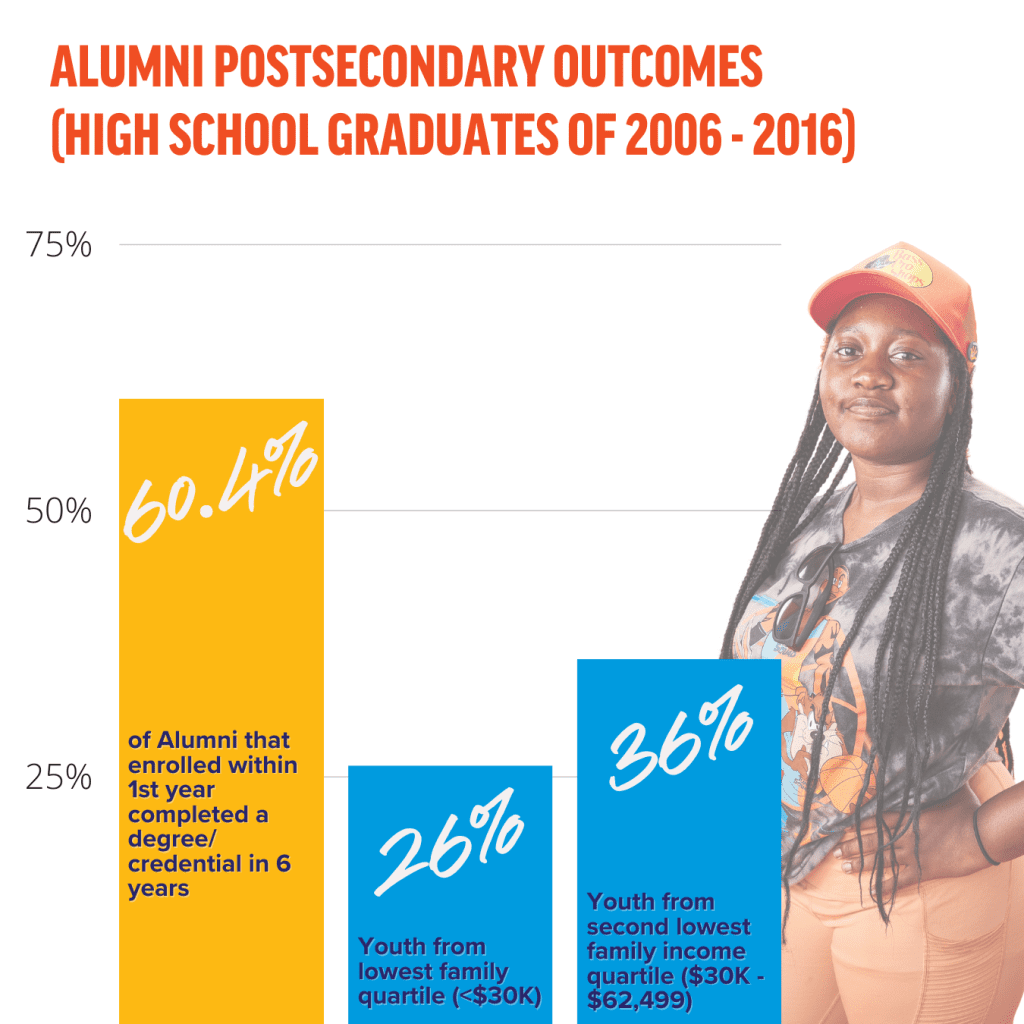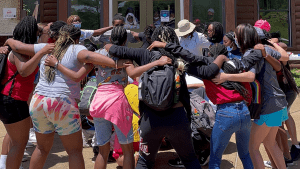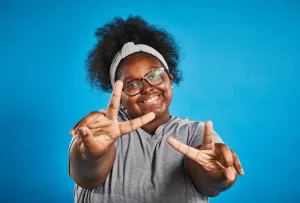by Nicki Thomson, PhD
Senior Director, Research and Learning
Wyman is committed to ensuring strong outcomes for youth, learning from our experiences, and centering the voices and perspectives of the young people we serve. Over the last 3 years, we have interviewed and collected educational data from alumni of our Wyman Leaders program, and we are excited to share initial results.
Since its inception in 2002, over 1,400 St. Louis area young people have engaged in Wyman Leaders, a multi-year leadership development program. Anchored in our 125+ year use of camp and community partnerships as powerful youth development tools, Wyman Leaders supports young people to build leadership skills and to plan and engage in their chosen postsecondary education and career pursuits. The program has served primarily youth of color with limited financial means.
Wyman Leaders has evolved over the years from our lessons learned and feedback from teens. Currently, it supports young people from the summer before their 9th grade school year through 4 years after high school graduation using evidence-informed practices. Youth participate in intensive summer experiences that include:
- A 3-week residential summer camp,
- Receiving support and resource connections from trained Wyman staff, and
- Receiving individualized resources and support for career exploration and postsecondary planning, including assistance with identifying educational and career goals, completing college applications, and securing financial aid.
Through partnerships with five Missouri universities, Wyman Leaders participants are offered additional benefits including on-campus support and access to dedicated scholarships. The program experience is rooted in the strong, supportive relationships youth build with adult staff and peers over time.
Evidence of Success
Our results consistently show that Wyman Leaders students build social-emotional and leadership skills, they graduate from high school on-time, and enroll and persist in postsecondary education at rates that meet or exceed regional and national benchmarks. Research conducted at Missouri State University, one of Wyman’s higher education partners, showed that students who were served by this partnership maintained higher GPAs and achieved higher retention rates in their first year of college than similarly matched peers from the same high schools (Reed, Thomson & Bramman, 2018).
Recent analysis of National Student Clearinghouse records from over 500 of our program’s alumni (high school graduates of 2006-2016) provide additional evidence of program impact—rates of postsecondary enrollment and completion among our alumni exceed rates for youth with similar demographic characteristics:
No difference was found in degree completion by race/ethnicity and, further, youth who attended one of Wyman’s higher education partner schools were more likely to complete a degree than youth who did not. These results confirm that Wyman Leaders positively impacts the lives of young people and helps to address longstanding inequities in postsecondary access and success.
But how does the program exert its influence? What is that “special sauce” that drives program success?
The “How” – Wyman’s Secret Sauce
To explore these deeper questions, Wyman is engaged in a partnership with qualitative researcher Dr. Florian Sichling, Assistant Professor of Social Work at the University of Missouri St. Louis (UMSL). Beginning in 2020, Dr. Sichling and Wyman’s Research & Learning team planned and launched a project to understand the “secret sauce” by talking directly with those who have experienced the power of the program: Alumni.
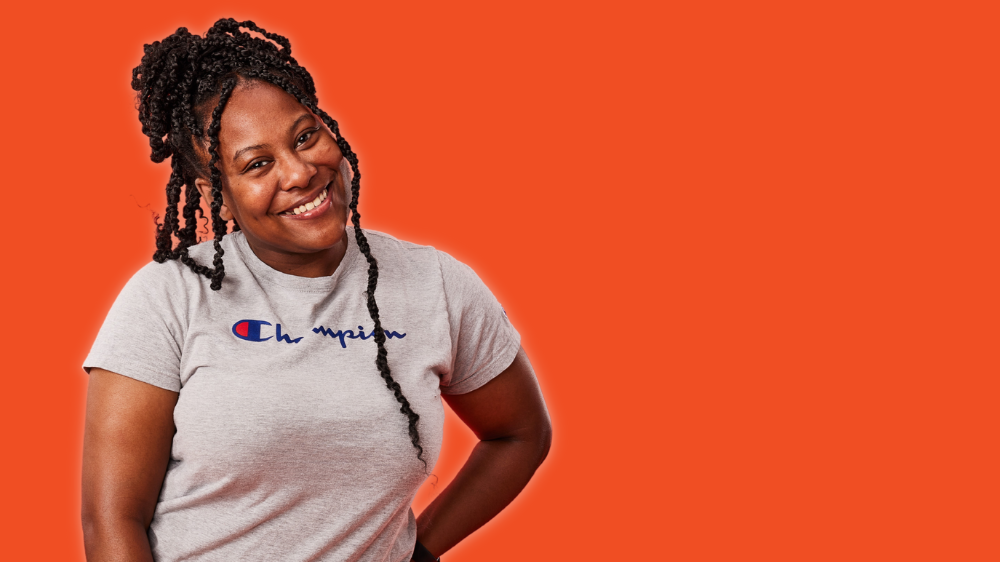
Key Learnings
To date, interviews have been completed with 82 Wyman Leaders alumni. Analysis of this robust set of interview data has resulted in several overarching themes and important implications for the Wyman Leaders program and beyond.
Interview Themes:
#1 Central importance of camp – a prominent theme from the interviews, the residential stay at Wyman’s camp in Eureka, MO, as well as the other intensive summer experiences like touring colleges and staying overnight on a college campus, left a lasting impression on many alumni. The use of camp as a positive youth development tool differentiates the Wyman Leaders experience from many other programs.
“I had a chance to be whatever I wanted to be when I went to camp. When I went to college tours, when I went to stay at a college for three weeks. I didn’t have to be a product of just my environment.” (Class of 2012)
#2 Experiences and exposure – youth engage in new activities, new experiences and gain new knowledge. As said by one Wyman alum, these experiences help with “breaking out of one’s shell”. They develop self-confidence and persistence, a deep commitment to making a difference in their communities, and they can begin to see a pathway for themselves to higher education.
“They had us out there, in the wild doing crazy things that I never thought I would do. I can go canoeing 20 miles and cook my own food. I can apply to this program that’ll take me halfway across the country, and I’ll be okay. Even if I don’t know what it’s gonna be like, I know I could figure it out. And so I 100% credit Wyman, with that part of developing my character in terms of confidence and just believing in myself more.” (Class of 2013)
#3 Relationships – through relationships with peers and with camp counselors and staff, young people develop important skills—such as conflict resolution, empathy and leadership—they gain access to critical resources and supports, and they receive the benefits of role modeling, such as modeled orientations toward different occupational fields.
“I think the biggest challenge was learning to deal with people that are unlike people you’ve met before, people that are really different from you and temperaments and interest and life exposure, you know, […] But I definitely remember a few times tense interactions with people and I think I was definitely better for it because I am really good with conflict. You stick a bunch of like teenage girls together in a cabin. It’s bound to happen.” (Class of 2012)
“A lot of my counselors were working in social work and going for their degrees in sociology it really warmed me up to the idea of a more humanist career path so I did ask a couple of them not about psychology but how they liked their positions in social work, in sociology, so I would say my decision to go into psychology was slightly influenced by that after I switched over from biological sciences.” (Class of 2014)

Implications and Application
Emerging interview themes provide a clear reminder of the critical importance of the summer experiences offered by Wyman Leaders, and the residential camp experience specifically. Results also provide a deeper understanding of how relationships work to drive impact, for example, with camp staff indirectly “role modeling” potential college majors and careers for young people. How might we harness this powerful dynamic to model non-college options like trades education? How do relationships within Wyman’s higher education partnerships support young people’s postsecondary success? These and other questions will be explored as we use program alumni feedback to strengthen and improve programming for the next generation of Wyman Leaders.


